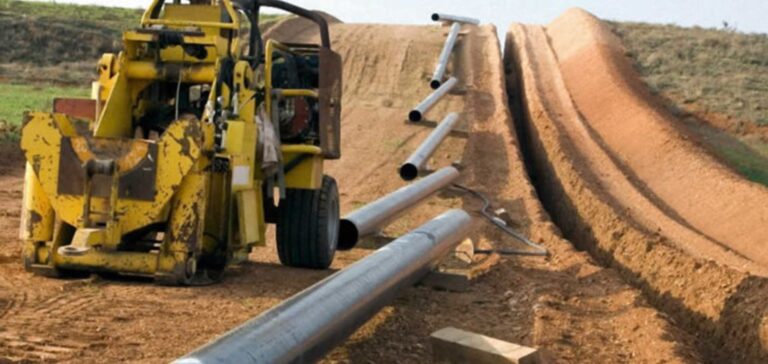Masked and helmeted Chinese and Nigerian workers hoist giant steel pipes over mounds of earth. Further on, smoke is coming out of the flashlights. Camouflaged in the millet fields, heavily armed soldiers are on the lookout.
In Gaya, in southwestern Niger, near Benin, Africa’s largest oil pipeline is taking shape. The pipeline is nearly 2,000 km long – 1,250 km of which is in Niger – and is intended to link the oil wells of the Agadem field in the far east, the scene of deadly jihadist incursions, to the Beninese port of Sèmè, from where Nigerien crude oil will be evacuated for the first time.
With a modest production of 20,000 barrels per day, Niger, one of the world’s poorest states, became an oil producer in 2011.
The black gold extracted by the China National Petroleum Corporation (CNPC) has so far been transported by pipeline to Zinder (south-central Niger), where it is refined.
Initially, Niger had planned to evacuate its crude through the Cameroonian port of Kribi via neighboring Chad, before opting for the Benin corridor.
Launched in 2019, the construction was supposed to be completed in 2022, but the Covid-19 pandemic has slowed it down, Nafiou Issaka, the deputy general manager of the West African Oil Pipeline Company (Wapco), the project owner, told AFP.
Wapco, a subsidiary of CNPC, is now working hard: more than 600 km of pipes have already been laid, “that is 51.5% of completion rate”, and Niger could sell its crude on the international market in “October or November 2023″, he hopes.
More than 700 soldiers are deployed to ensure “permanent security” of the structure even if a large part of the areas it crosses is so far spared from jihadist violence, a security source told AFP on condition of anonymity.
With the continued collapse of revenues from uranium, of which Niger is a major producer, the country is counting on black gold to boost its budget, much of which is being injected into the fight against jihadist groups in the southeast and west.
“Six billion dollars will be invested in the construction of this pipeline. It is the biggest investment of Niger (a former French colony) since its independence (in 1960)”, observes Kabirou Zakari, the director of Hydrocarbons at the Nigerien Ministry of Oil.
– “Smuggling” from Nigeria –
By 2023, oil production will be increased to 110,000 barrels per day, of which 90,000 barrels will be exported, he said.
Oil will thus “generate a quarter of the country’s GDP” (more than 13.6 billion dollars in 2020 according to the World Bank) and “about 50% of Niger’s tax revenues”, compared to 4% and 19% respectively at present, notes Mr. Zakari.
According to him, Niger’s reserves “are around two billion barrels”. And according to official projections, Niger will produce 200,000 barrels per day in 2026 and 500,000 barrels in 2030.
Sonatrach, the Algerian state-owned oil company, announced that it had made an “encouraging discovery” of oil in Kafra (north), a vast area of 23,737 km2 near the border with Algeria, which adjoins the Algerian oil basin of Tafassasset, also operated by Sonatrach.
The British company Savannah Petroleum claims to have discovered new deposits in Agadem where the Chinese are already operating.
Despite local production, the black market in hydrocarbons flourishes in Niamey and the major cities.
According to Niger Customs, this market “is regularly supplied by networks from neighboring Nigeria” and giant oil producer.
In the black market, a liter of gasoline costs 300 CFA francs (0.4 euros) compared to 540 CFA francs (0.8 euros) at the pump, a rate “considered expensive” by the unions. On Tuesday, Niger’s president, Mohamed Bazoum, denounced the extent of “fuel smuggling” from neighboring Nigeria, which has become a source of “supplies for terrorists” via the “Niger River (in dugout canoes) and on motorcycles” to Mali.
“We must find a good answer” to cut off “the terrorists” from this source of “fuel supply,” urged the Nigerien president, who was speaking to security forces in Dosso, the major southwestern city near Nigeria.





















